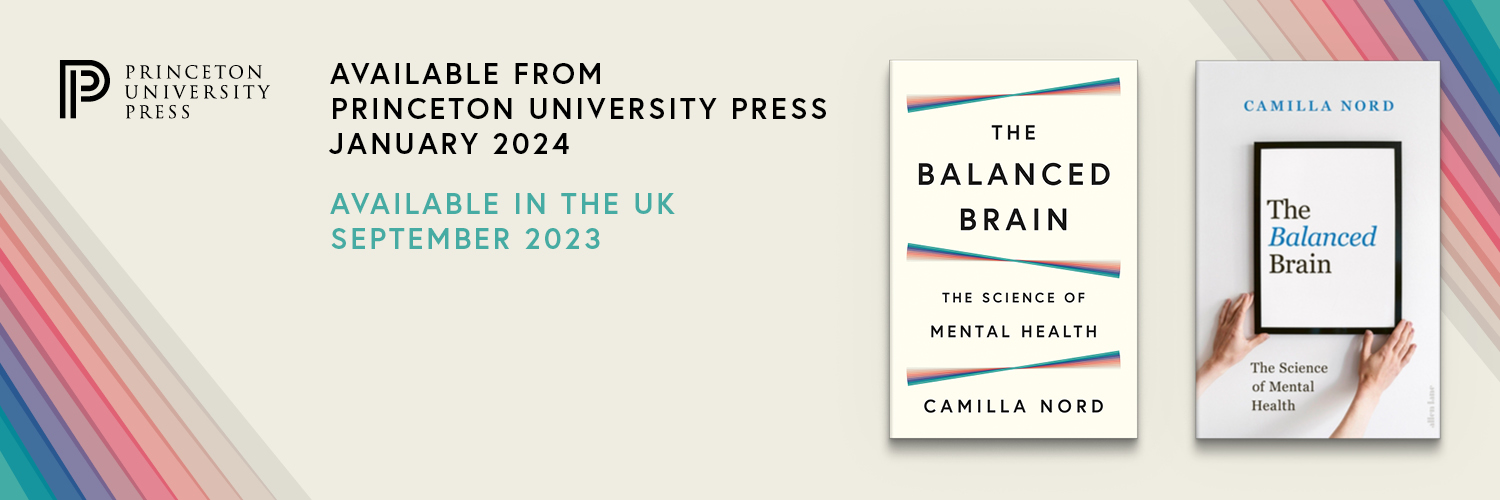
Camilla Nord
@camillalnord
Neuroscientist @Cambridge_Uni 🧠 Programme Leader @mrccbu 📖 The Balanced Brain UK: http://tinyurl.com/465vyfen US: http://tinyurl.com/v7k65k37
🧠🧠🧠🧠🧠
🔝 shots from last night's talk, The Balanced Brain: the science of mental health, with @camillalnord. Camilla provided everyone with a revelatory tour of the scientific and technological developments that are changing the way we think about mental health.
Breaking through the mind-body divide: patient priorities for interoception research This broad scoping study establishes new, transdiagnostic, patient-led priorities for the developing field of #interoception in #psychiatry thelancet.com/journals/eclin…
This week’s issue, featuring our Summer Books list; @camillalnord on mental illness; @PeterKGeoghegan on mass protest; @dlbirch1 on literary influencers; @KatyaTaylor on teen-centric novels; @darra_goldstein on war and food; @rinireg on Musk–Trump – and much more
Patient priorities for interoception research, just out in Lancet @eClinicalMed 🧠🫁🫀 ⬇️⬇️⬇️ — the first pub from our @wellcometrust Mental Health Award Led by the brilliant @gabriel_mackie & @LydiaJHickman
🚨 New paper 🚨 How do people with mental health conditions experience bodily signals, and what are their priorities for interoceptive research? These questions are what @LydiaJHickman and my new paper in eClinicalMedicine tries to answer. 🧵 1/8 sciencedirect.com/science/articl…
Bridging gaps in the balanced brain… Toby Engelking reviews the book 'The Balanced Brain: The Science of Mental Health' by @camillalnord (@AllenLaneBooks). bps.org.uk/psychologist/b…
Loved talking to @lucycfry about why antidepressants worked for her - including telling her about @OxfordPERL's discoveries - and why despite what some might think, there is nothing inherently contradictory about antidepressants & psychotherapy. inews.co.uk/inews-lifestyl…

this is such a common theme in public health. You need a term in your equation for the fact that people enjoy things – drinking, eating sweets, whatever – or they look like pure costs with no benefit whatsoever, so the seemingly correct thing to do will always be to reduce them
I read a lot of strategies and reports on obesity and health, and it’s striking how few of them mention words like conviviality or deliciousness, or the idea that food is a source of joy, comfort and love.
Extremely into this body-wandering idea. Accords completely with what our @wellcometrust lived experience experts tell us about the role of intrusive bodily signals for their mental health, including the bladder! (Findings forthcoming with LydiaJHickman @gabriel_mackie @DrSFink)
Crucially, we found that higher levels of body-wandering were linked to more negative thoughts, especially those involving the heart, bladder, and skin. This suggests that focusing on bodily sensations during rest is associated with increased anxiety and negative affect.
Interested in postgraduate study? Our MPhil in Cognitive Neuroscience includes advanced training in neuroimaging, world-leading faculty, and a bespoke research project in an outstanding Cambridge lab. Join our close-knit student cohort - apply by 03 Dec: mrc-cbu.cam.ac.uk/study-with-us/…
I 🙏 this cohort study is onto something but… In 2020 this study found that diabetes treatment with #GLP-1 receptor agonists was associated with >50% reduction in the risk of #Parkinson’s disease: academic.oup.com/brain/article/… 4 years later & the phase III trial was negative…
A substantial reduction of #Alzheimers disease associated with semaglutide (Ozempic) in > 1 million people with Type 2 diabetes from a nationwide data resource alz-journals.onlinelibrary.wiley.com/doi/10.1002/al…
Sometimes mental health researchers get accused of me-search but if I was doing me-search I would 100% run the below study on why I love spicy food so much 🌶️ 🌶️ 🌶️
"The expectations humans have of a pleasurable sensation asymmetrically shape neuronal responses and subjective experiences to hot sauce" aka "Your Brain on Hot Sauce (when you like it)" 🥵🥵🥵 journals.plos.org/plosbiology/ar… Someone tell @seanseaevans and @hotonesgameshow #HotOnes
I was interested in the psychotherapy in psychedelic-assisted psychotherapy before it became mainstream. This summer I joined two of the psychotherapy researchers I respect most (@pimcuijpers and @joarhalvorsen) to write this viewpoint out now @JAMAPsych jamanetwork.com/journals/jamap…
"Are we looking in the wrong place for answers to Britain's mental health crisis?" - me, for @spectator spectator.co.uk/article/are-we…
Really interesting to see that UKRI's policy for genAI is not stringent for applicants - grants written using AI are allowed as long as not wrong/plagiarised/etc. - but very strict for reviewers, who are forbidden from using AI at any point (or speculating re: applicant use)
Today we've launched a policy that sets out our position on the use of generative AI during the funding application and assessment process, and the responsibilities of individuals involved, including applicants, assessors and UKRI as a funder. More: orlo.uk/SKCVg
New lab paper out in @NatureHumBehav showing ppl build cognitive maps of social networks to track how information flows. How are these maps built? A replay-like mechanism reshapes them over night😴, making them more abstract, which helps with hardest social navigation problems
How do people track information flow through social networks? New research finds that extended periods of rest, like sleep, help people build abstract cognitive maps for efficient navigation of social networks. @marclluis @orielf @apaxon nature.com/articles/s4156…
One of the best examples of what neuroscience can contribute to psychiatry is the SAINT TMS protocol - a neuroscience-driven treatment for depression that appears more effective than all other comparable treatments & the first (only?) FDA-approved use of fMRI @BuchananNeuro

Brad Treeby (1) persisting for 11 years (2) shaving his head and (3) making a scanning tank out of a wheelie bin really makes me question everyone else’s commitment to their experiments @Brainbox_Neuro #BBI2024


Ever felt less motivated to take on effortful tasks? Our latest study sheds light on a key mechanism behind that choice: lactate levels in the brain’s dmPFC/dACC Great work by @ClairisN and A Barakat in the lab @Brainmind_EPFL @NeuroLeman @epflSV Link: doi.org/10.1038/s41380…
At #BACN24? Interested in Interoception and emotion? Please check out poster #47 where @bethlongley will be describing the protocol which forms part of our Em-Body @wellcometrust grant with @camillalnord and team